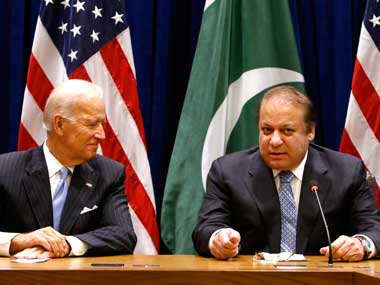 United Nations, Sep 27: Pakistan Prime Minister Nawaz Sharif today raked up the Kashmir issue at the UN General Assembly here and blamed India for "another missed opportunity" to address outstanding issues by canceling the Foreign Secretary-level talks. Asserting that a "veil" cannot be drawn over the "core" issue of Kashmir, he said Pakistan is ready to work for resolution of this problem through negotiations.
United Nations, Sep 27: Pakistan Prime Minister Nawaz Sharif today raked up the Kashmir issue at the UN General Assembly here and blamed India for "another missed opportunity" to address outstanding issues by canceling the Foreign Secretary-level talks. Asserting that a "veil" cannot be drawn over the "core" issue of Kashmir, he said Pakistan is ready to work for resolution of this problem through negotiations.
"Our support and advocacy of the right to self-determination of the people of Jammu and Kashmir is our historic commitment and a duty, as a party to the Kashmir dispute," he said while addressing the annual UN General Assembly session.
Needling India, Sharif said that more than six decades ago, the UN had passed resolutions to hold a plebiscite in Jammu and Kashmir. "The people of Jammu and Kashmir are still waiting for the fulfillment of that promise," he said.
"Many generations of Kashmiris have lived their lives under occupation, accompanied by violence and abuse of their fundamental rights. Kashmiri women, in particular, have undergone immense suffering and humiliation," he said. For decades, attempts have been made, both under UN auspices and bilaterally in the spirit of the Lahore Declaration, to resolve this dispute, he said.
"The core issue of Jammu and Kashmir has to be resolved. This is the responsibility of the international community. We cannot draw a veil on the issue of Kashmir, until it is addressed in accordance with the wishes of the people of Jammu and Kashmir," Sharif told the gathering.
India had called off the Foreign Secretary-level talks in August after Pakistan High Commissioner Abdul Basit met Kashmiri Hurriyat leaders in New Delhi, ignoring India's warning not to meet the separatist leaders.
In his address, Sharif said, "We were disappointed at the cancellation of the Foreign Secretary-level talks. The world community, too, rightly saw it as another missed opportunity "Pakistan is convinced that we must remain engaged in the dialogue process for settling disputes and building economic and trade relations. Let us not ignore the dividends of peace."
Both India and Pakistan have separately stated that there was no planned meeting of Sharif and Prime Minister Narendra Modi on the margins of the UN session. Sharif, however, gave enough indications that Pakistan was not averse to resumption of the dialogue process with India.
"Pakistan is ready to work for resolution of this problem through negotiations," he added. Sharif said that it is his government's "aspiration and effort" to build a peaceful neighborhood by pursuing a policy of constructive engagement.
"In South Asia, our people have missed opportunities for prosperity because of unresolved conflicts. We have a choice today: continue with the status quo or to seize the moment to resolve all outstanding issues and free up our shared energies for cooperation. To take this course of high statesmanship, we need more, not less, dialogue and diplomacy. We need to respect each other's rights and sensibilities. We must have relationships based on equality, mutual respect and transparency," he said.
Sharif said that as a "responsible" nuclear weapon state, Pakistan will continue to support the objectives of nuclear disarmament and non-proliferation; and pursue a policy of nuclear restraint and credible minimum deterrence.
"Pakistan is not participating in any arms race in the region. Yet we cannot be oblivious to the emerging security scenarios and buildup of armaments. We too, have the obligation to maintain a robust and reliable deterrence," he said.
Condemning terrorism, Sharif told the UN General Assembly that his country is fighting terrorism "planted" on its soil and has resolved to fight the "scourge" to the finish. "We condemn terrorism in all its forms and manifestations. We are fighting terrorism planted on Pakistan's soil. Our valiant soldiers are laying down their lives to take out terrorists and tear down their evil networks. The entire nation is behind them," Sharif said.
He said that in the past 13 years, Pakistan "as a frontline state" has sacrificed tremendously due to terrorism. "Over 50,000 people have lost their lives and thousands have suffered serious injuries. Our economy has lost hundreds of billions of dollars in direct costs and denied investment opportunities...It is the resolve of our nation to fight this scourge to the finish," he said.
Stating that Pakistan remains committed to forging a deeper bilateral relationship with Afghanistan on the basis of equal security and shared prosperity, Sharif said, "Our two nations confront common challenges, which call for greater cooperation and understanding between our two nations. I congratulate the people of Afghanistan over the successful completion of the electoral process and offer our warm felicitations and good wishes to the new Afghan leadership."
"It is our earnest hope that these landmark processes would culminate in the emergence of a stronger, more stable, and unified Afghanistan. We also hope that the process of inclusive Afghan-led and Afghan-owned reconciliation would move forward, contributing to greater harmony, stability and prosperity in Afghanistan," he added.






Comments
Add new comment